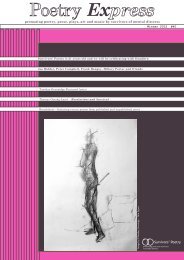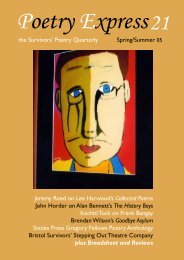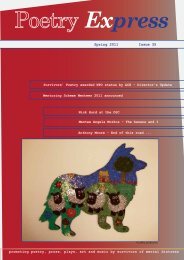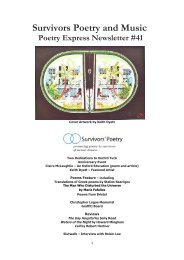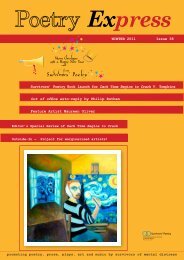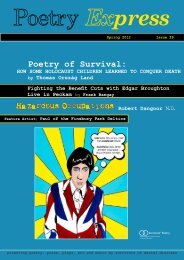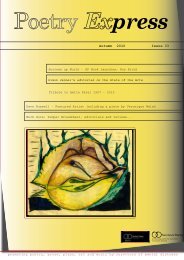Download - Survivors Poetry
Download - Survivors Poetry
Download - Survivors Poetry
- No tags were found...
Create successful ePaper yourself
Turn your PDF publications into a flip-book with our unique Google optimized e-Paper software.
of Love is fairly simplistic bitter cynicism, an interestingcontrast with the whimsical charm of The World of family– where the poet is happily lured into the ‘paradise ofnaiads’. Novel comparison of solitude with a scorpion(Scorpion). In Departed Leaves both parties are depictedas leaves, and shown as being equally vulnerable to theelements. In Museum of Reminiscence, a cold, malignantgoddess turned into an ‘Unforgettable statue’. Love’sErrand: a charming conceit: “Now if you see a whirlpool/Think that/These may be love’s messengers/Seeking fortheir love.” His veneration for idols is not unqualified:at the end of Valentine’s Day, he can say “I was just anidol,/heedless of love.” Lost Love challenges the jiltingbeloved to arouse his passions again, after she hasrejected and seemingly destroyed them. Prisoner portraysanother callous icon. Very painful conclusion: “I washanged/On the noose/To face her again.//Who wantedto kill me/Daily/With a dreadful death/by her glimpses”.Iris concerns a vindictive figure who spreads flames ofvengeance, but maybe these flames represent her searchfor love. In Future Generation, the next generation is abrutal figure of revenge. Unusually for this collection, theimagery of war and devastation is uppermost here.The Secret of Moments sequence concentrates oncrucial, traumatic moments which leave a permanentimpact in the memory: “My recognition died away/And Iwas called ‘insane’”. The shock gives the poet a sense of‘My hateful personality’. In Moment 3, the beloved has amass of ‘secret admirers’ with whom she shares laughter.It concludes: “In these joyous moments/My memorynever blazed you”. This is novel phraseology indeed;is he referring to his memory’s power to penetrate,and establish contact with his beloved? Or should thatphrase be revised? In Moment 4, the ‘tables are turned’;the formerly aloof beloved will descend to the lover’scondition, and be in need of his emotional nourishment.Gem celebrates the treasured memory of a love wound inan ‘ocean of grief’ heart.Peace: this is a state which a human soul can outlive.There are some homages to courage, such as Alexanderthe Great and Hawks of Air. Wildlife is celebrated inSparrows. I have to say I found Corridor obscure, perhapsintentionally cryptic. The poet seems to be on somenocturnal walk in a tomb, contrasting himself seeminglywith ‘The paupers senseless of everything’. The nightis dismissed by a slogan of ‘Haq’. This seems to be anIslamic term. An explanatory footnote would have beenhelpful here. Cemetery: a reflection on human selfishnessreaching as far as the grave (and beyond?) The mournersleave the grave after the ceremony, but no one seems todie for others. Life describes life as ‘God’s deposit’. TheRiver Bank is devotional: “. . . there embraced earth andsky,/O! Lord from your nature who can deny. Promisesis cryptic: there is a sense of desolation about brokenpromises, combined with desperation about being theprisoner of a promise: “You are confined in love’s cage/While I roam in the lone streets.” Poor Child is deeplycompassionate, the image of the child speaking for themasses of humanity who are oppressed throughout theirlives. By way of comparison, The Journey With Life tracesthe life cycle, culminating in the frustrations and sadnessof a weary old person.Simple sense of wonderment in I Wonder. I Never Dreamtseems a departure from most of his utterances, whichseem to treasure dreams and long to preserve them. Buthere he desires the prerogative to obliterate them. I havenot mentioned all the poems in this collection, as I foundsome of them to be ephemeral. However, these are faroutweighed by the substantial contact. Hamza bravelyfaces the contradictions of the benign and the malign, thevalid and the invalid, the transient and the permanent.Hamza Hasssan Sheikh Thirst all Around (novella)Daffodil Publications, IslamabadAn utterly charming portrayal of adolescent love problemsin the context of a university campus in Pakistan – ‘thefrolic spring of youth’. It is overall understated, withonly one passage approaching explicitness. Some westernreaders my find a hint of archaism in its style, which alsoseems to be present in Bollywood movies. According tothe blurb, “The novel is about love that is mysterious andabove any definition, yet is an important aspect of everyhuman. Hamza is a craftsman who knows how to use thetools of fiction to sketch blackmailing and man’s lust forwoman.”His own preface shows great perceptivity: “Love isunknown passion for unknown person for unknown reason.A person can be a silent but not senseless of animations.It is possible: he may have better ideas about someonethan the talkative one. I read faces silently and peep intoeyes to find the realities because I believe in feelingsmore than words.”A strong sense of mystery and speculation pervadesthis work, which is strongly observant of the surfacemanifestations of others: ‘the changing faces always havedifferent stories behind different veils’. The openingexquisitely captures a new undergraduate’s sense ofstrangeness and trepidation, followed by the blossomingof a shy man’s first crush. The whole work is an acuteexploration of shyness, set into counterpoint against ahigh degree of blatant, aggressive sexuality, its patternsenriched by the portrayal of parallel flirtatious couplings,a gossip grapevine and cross–couple confidences in theof a closely–knit student community, where jealousyperiodically rears its head. Interestingly, at their firstintroduction on a bus, she asks to see his writings.Academic coursework and original poems are ice–breakingcomponents of the opening of erotic innuendo; at onetender point, both parties are writing simultaneously, infull view of each other.The author states that “The atmosphere of universitywas brimful of romance” and later refers to the ‘PublicUniversity of marriage and love’. But there is no realreference to any of the participants getting marriedand living happily ever after on the basis of meetingat university. Nor is there any portrayal of their homeand family backgrounds – against which the studentsare presumably reacting while at university. It is alsonoticeable that the only academic references made hereare to English Lit – what about the other subjects?The girls on campus are ‘Roamers’, ‘hunters of handsomeguys’. There are portrayals of girls making overt sexualovertures by email. However, they retain a certain amountof old–fashioned prudishness, wrapping their copies of AMidsummer Night’s Dream in plain covers. They practicefree love, and then wear their Pupatta veils to covertheir shame; that self–same veil is elsewhere described



